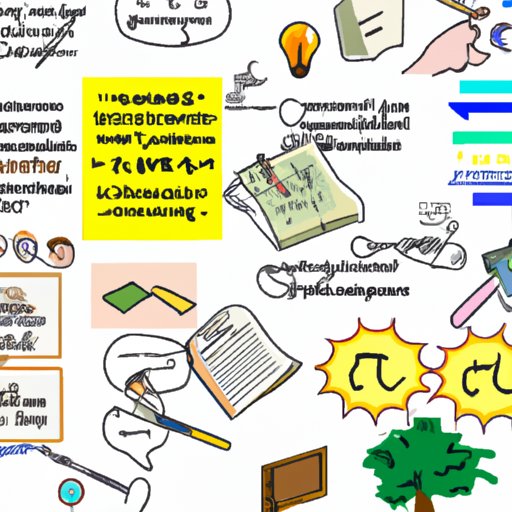Introduction
Studying science can be an intimidating process. With the vast amount of knowledge to learn, it can be difficult to know where to start or how to effectively retain information. Fortunately, there are several strategies that can help make studying science easier and more efficient. This article will explore a variety of tips and techniques for studying science effectively, from developing a study plan to utilizing visual aids.
Develop a Study Plan
The first step in studying science is to develop a plan. Start by setting goals for what you want to achieve and create a schedule for when you’ll work on each subject. Make sure to break large tasks into smaller chunks so that you don’t become overwhelmed. Additionally, choose appropriate study materials such as textbooks, reference books, videos, and online resources that are tailored to your learning style.
Use Mnemonic Devices
Mnemonic devices are tools that can help you remember facts or concepts more easily. They use rhymes, acronyms, visuals, or other methods to encode information in your memory. For example, the acronym HOMES can be used to remember the Great Lakes: Huron, Ontario, Michigan, Erie, and Superior. Mnemonic devices can be especially helpful when memorizing formulas, equations, or other complex information.
Take Notes and Review Regularly
Taking notes is a great way to solidify new concepts and information. As you read or listen to lectures, highlight important points and summarize content whenever possible. Additionally, quiz yourself regularly to ensure that you understand the material. Taking regular breaks is also essential; your brain needs time to process and absorb new information.
Practice Problem Solving Skills
Problem solving is an important part of studying science. To become proficient, you must understand the problem-solving process and identify common mistakes. Try different approaches to solving problems and practice as much as possible. It’s also a good idea to ask your teacher or professor for help if you’re having difficulty.
Utilize Visual Aids
Visual aids such as diagrams, flowcharts, and infographics can also help you better understand and retain scientific information. They provide a visual representation of concepts and can be used to explain complicated topics. Additionally, they can help you organize information and make connections between different ideas.
Find a Study Partner
Finding a study partner can be a great way to stay motivated and accountable. Working with someone else can help keep you on track and give you the opportunity to discuss ideas and ask questions. You can find a study partner through social media, student organizations, or even by asking a classmate. Just be sure to set ground rules and establish expectations before you start working together.
Conclusion
Studying science can be a challenging but rewarding experience. By following these tips and techniques, you can develop an effective study plan, utilize mnemonic devices, take notes and review regularly, practice problem solving skills, utilize visual aids, and find a study partner. With dedication and determination, you can master any scientific subject.
(Note: Is this article not meeting your expectations? Do you have knowledge or insights to share? Unlock new opportunities and expand your reach by joining our authors team. Click Registration to join us and share your expertise with our readers.)
